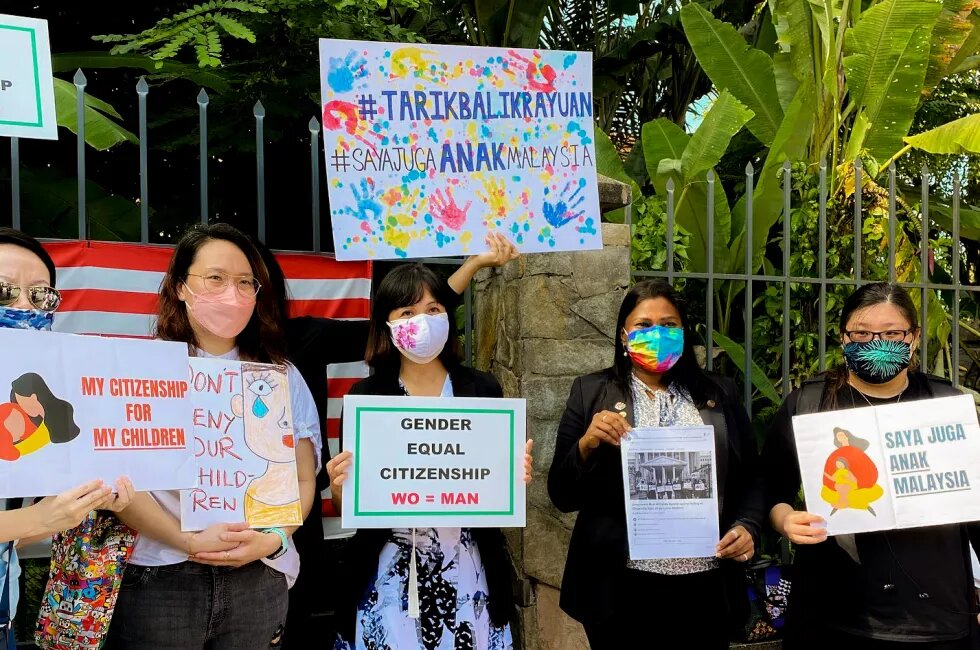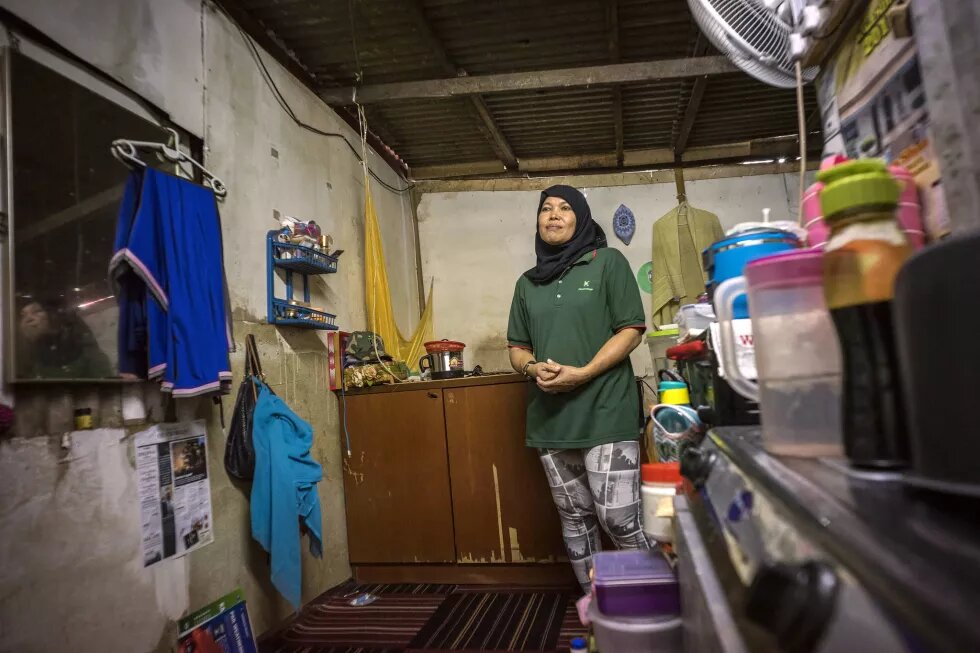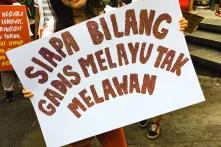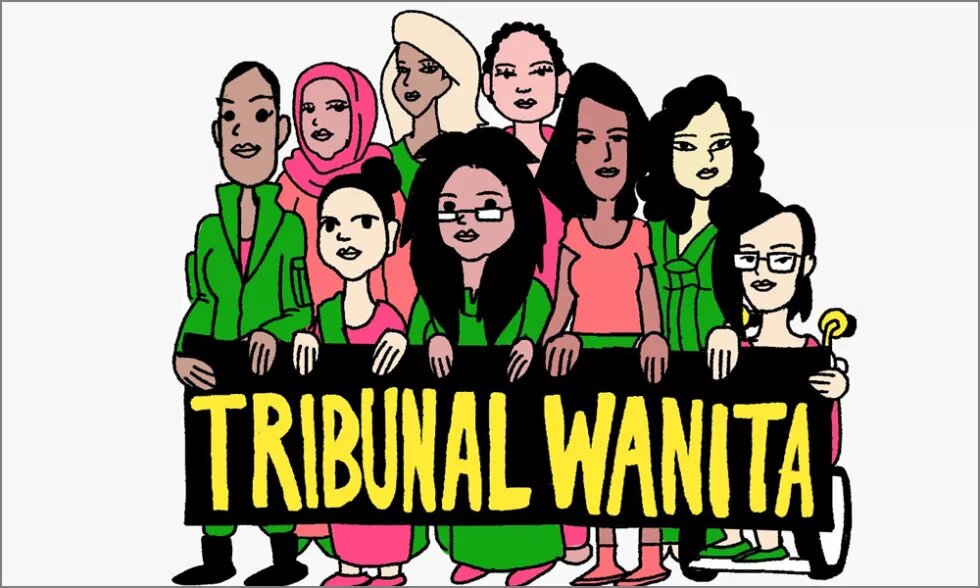
A brief report of Women’s Tribunal Malaysia, an inclusive public online forum, gathering 26 women from diverse backgrounds to offer testimonies on the discrimination they face in various aspects of their lives – with a spotlight on three fronts. Activists and lawyers acting as informal advocates and judges then offered recommended next steps to best effect change.
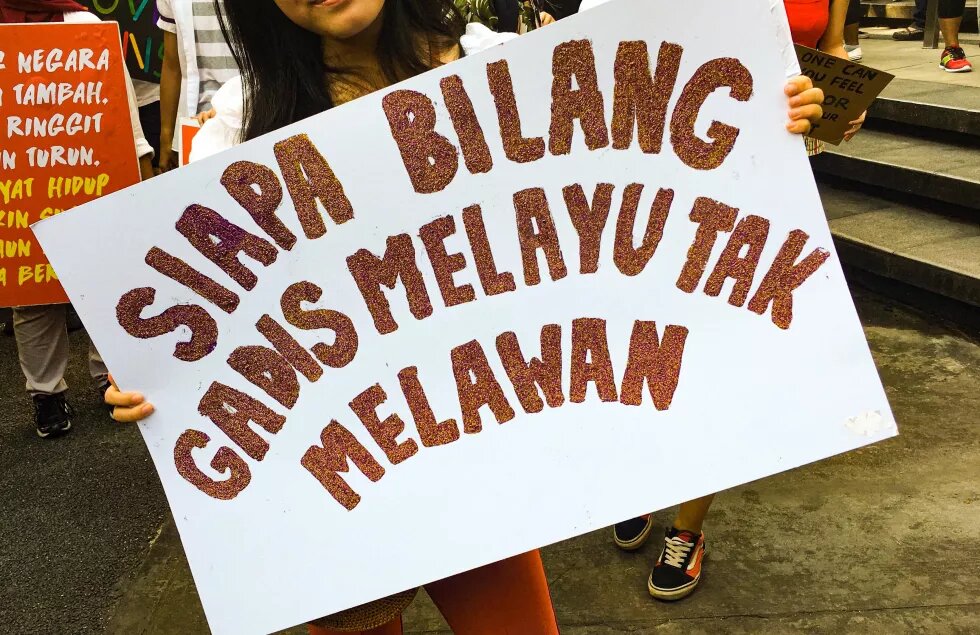
In late November, 14 women’s rights organizations in Malaysia forming the Joint Action Group for Gender Equality, together with Engender Consultancy, came together to organize Women’s Tribunal Malaysia – the first of its kind in the country. This “tribunal” is not legally sanctioned and does not amount to a formal judicial process, but aims to raise public awareness and pave a direction for further advocacy. It offers Malaysian women from diverse marginalized groups, including indigenous women and transwomen, a public online forum to directly share their experiences of discrimination spanning all aspects of life.
The Women’s Tribunal comes at a time when Malaysia joins the United Nations Human Rights Council for 2022-24, and as it prepares to submit its periodic report next year to the committee on the Convention on the Elimination of All Forms of Discrimination Against Women (CEDAW), which it ratified in 1995, with certain reservations. In total, 26 women came forward to present their impassioned testimonies. Some appeared themselves on video or audio, while some relayed their experiences through representatives; some also remained anonymous or used a pseudonym. Nine activists and lawyers acting as informal advocates then contextualized the women’s testimonies to identify gaps in domestic and international law, policy, and cultural or institutional structures that have led to miscarriages of justice. Finally, the three “judges” – Zainah Anwar, a founding member of Sisters in Islam; Mary Shanthi Dairiam, a former member of CEDAW; and Nadia Malyanah, a campaign officer with youth organization Undi18 – announced their recommended next steps to best effect change.
Their stories touched on varied issues: the inability of Malaysian women to confer citizenship on their children born abroad, the difficulties Muslim women face in claiming child support and the permitting of a father’s unilateral religious conversion of children under shariah law, the non-recognition of rape within marriage, and child marriage among the refugee community. In addition: the sexism, harassment, and violence experienced by women in the workplace and elsewhere, the inadequate medical access for indigenous women living in rural areas and the loss of their livelihoods due to deforestation, and the insufficient recognition of transwomen, domestic workers, contract hospital cleaners, sex workers, and those with disabilities. By no means an exhaustive list, these issues also intersect and exacerbate one another, made even worse by the pandemic. The challenges are many, but this article will discuss the progress of women’s rights in Malaysia along three fronts.
Patriarchal attitudes in family law
Priscilla Collar, a Malaysian mother, has two daughters who are not Malaysian citizens and a son who is. She married a French national and gave birth to her two daughters in France, while her son was born in Malaysia.
Malaysian mothers do not have the same rights as Malaysian fathers to confer citizenship to their children born overseas. Under the federal constitution, fathers are able to do so automatically but mothers must make a formal application before their children turn 21 years old. Approvals, granted at the discretion of the Ministry of Home Affairs, are rare, and many applications have been rejected without reason after years without communication. From 2013 to 2018, only 142 such applications were approved, while 3,715 were rejected and 4,959 were pending. Moreover, many women said they did not even know that this law existed, as they were not clearly advised by immigration or embassy staff. In the past two years, the pandemic has further exacerbated the hardships for families, with travel restrictions making it more difficult for Malaysian women to return home to bear children.
In 2015, Priscilla returned to Malaysia with her three children as a single mother after she and her husband divorced. At the start, she had to acquire tourist visas for them, exiting and entering every 90 days, which cost RM 36,000 in total for nine trips up until 2017. Given the barriers to public schooling for non-Malaysian children, she also had to enroll them in an international school, which amounted to RM 308,878 – a cost she would not otherwise have incurred. This does not include their yearly student visas, which has cost RM 5,500 so far. As non-Malaysians, her daughters also do not have access to public healthcare, and Priscilla is not eligible for any social welfare schemes as their mother. She does not receive monetary support from her ex-husband, and the pandemic compounded her financial difficulties after she lost her job in the flailing hospitality industry.
When the Malaysian government ratified CEDAW in 1995, it made a reservation to a clause dealing with nationality. Its reluctance to treat women equally to men in conferring citizenship seems to stem from a belief that fathers should have rights over their children in a marriage. The Kuala Lumpur High Court offered some hope when it ruled, in a case brought by six mothers and Family Frontiers, that both parents have equal rights to confer citizenship. However, the government appealed the decision and repeatedly opposed the change. In any case, the Tribunal’s judges recommended that the government amend the federal constitution to grant mothers the same right as fathers, aside from an interim measure to provide immediate relief for the children affected.
“For all Malaysian mothers, our number one fear is separation,” Priscilla said. Her eldest daughter will turn 18 in five years, and she is at a loss as to what would happen then. Priscilla has spent most of her life in Malaysia and only lived in France for six years; it is not home. “If the government doesn’t want to give citizenship to our kids, why not have a special visa or pass to enable kids to go to a government school or a government hospital?” she pleaded.
Zainah Anwar spoke plainly, when she expressed her disappointment at the lack of parity for women under Malaysia’s family laws, including under shariah family laws. She pointed out that this disparity is the reason why Malaysia, a middle-income country, often lies in the bottom half of many international surveys on gender equality. “Research shows that without equality in the family, there can be no equality for women in the public sphere,” she said. To this end, she also recommended that inconsistencies between the sharia and civil legal systems be resolved and that an alternative family court system be created to encompass both jurisdictions, as well as customary law, to enable a more conciliatory manner of resolving disputes through mediation.
Discrimination and abuse in the workplace
Meenambal, a local domestic worker, told the Tribunal of her troubles earning only about RM500 a month, with no written contract and no capacity to ask for better wages, hours, sick leave, or medical benefits. She needed the money so she could not quit, even when she developed severe allergies from being exposed to strong detergents and bleaching agents and had to seek medical treatment at her own expense.
She pleads for domestic work to be considered work, which it is not, at present. There is no specific legislation that governs the rights of domestic workers, and the 1955 Employment Act refers to women like her as domestic “servants”, not “employees”, and excludes them from key legal protections granted to other workers. The recently proposed amendments to the Act would change the term, but lawyer Vivian Kuan, one of the Tribunal’s advocates, pointed out that this change would only be cosmetic since the exclusions pertaining to them would still apply. She also pointed out that because local domestic workers usually work for multiple employers, they are often considered self-employed, and as such are denied further benefits.
“I know that I am discriminated against because I am a woman. Our culture and all my employers think that housework is work that all women do, especially poor women,” Meenambal said.
The same problem plagues foreign domestic workers in Malaysia, who tend to live with their employers. Zainah Anwar pointed out that this leads to an “ill-defined and subservient relationship that often results in long working hours and poorly defined tasks” and is easily susceptible to abuse. She also cites a 2016 International Labour Organisation report, which found that foreign domestic workers in Malaysia work the longest hours in the world – an average of 14.62 hours a day.
This can be tantamount, she said, to “forced labour”, especially given employers often withhold passports and the legal and practical challenges of authorities inspecting private domains. Similarly, foreign domestic workers are unable to negotiate their own terms of work, which are usually agreed to between their employer and the agency that recruited them. There exists memorandums of understanding between Malaysia and the workers’ host countries, but these are not binding.
There have been many shocking instances of domestic worker abuse in Malaysia, and the well-known Adelina Lisao case is the most grievous example of domestic worker abuse in recent history. Just in her twenties, she had been treated so badly by her employer – she was found with a swollen face, dog bite wounds, and acid burns, according to advocate Glorene Das of Tenaganita – that she died from multiple organ failure in hospital the day after she was rescued by the police. Despite this, the judiciary acquitted her employer of the charge of murder, though the attorney-general has appealed and the case will soon be heard in Malaysia’s highest court. At the same time, Das points out that the law also fails domestic workers who run away from abusive employers to save themselves – as, by doing so, they are deemed automatically to be undocumented and so are criminalized and prosecuted under Malaysia’s immigration laws.
The Tribunal judges recommended that the government should fully recognize domestic workers as employees, and grant them the basic rights available to other workers – either by amending the Employment Act or introducing a separate act with the input of women’s organizations. Kuan also advocated that employers should promote and use an employment contract endorsed by trade unions for local domestic workers, and that the government should ratify ILO’s Convention 189 and the Recommendation 201 on Decent Work for Domestic Workers, aimed at improving their working and living conditions.
Sexism, harassment, and gender-based violence
According to advocate Yu Ren Chung from Women’s Aid Organisation, recent studies on Malaysia done in the past two years estimate that, depending on the context, between 5 and 36 percent of women have experienced intimate partner violence, while 39 per cent have experienced stalking that caused them fear. Moreover, 36 percent of women had experienced sexual harassment either in the workplace, schools or universities, public transport, and other contexts, while 44 per cent had witnessed a teacher make a sexual comment.
Sofia told the Tribunal that a former partner, who also harassed her friends and family, online and offline, stalked her. He would call and text incessantly, wait for her at her house, threaten to go to her work place, and call her degrading names. He even demanded that she meet him for sex at least once a week if she wanted the harassment to stop.
Shakila Zen, an activist, was harassed online with sexual comments about her body after posting a video advocating for the environment. “As a muslim who wears a tudung, some of these comments really disturbed me,” she said, in tears. She also received Whatsapp texts asking her for sex services, apparently in response to an advertisement featuring her offering them. This online harassment spilled over into real life when her father received a package with a replica of a hand painted red and a note threatening to pour acid on her face and to burn her family’s home if she continued her activism.
Puteri Noraaina Balqis founded Save the Schools Malaysia, an Instagram platform that has collected close to 800 stories about sexual harassment in schools, when she heard about the backlash Ain Husniza received after outing a teacher’s rape joke on TikTok. Among the stories was a girl, who was stalked and almost raped by a schoolmate who followed her home. Another where a girl was groomed into an intimate relationship by a married ustazah (religious teacher), and multiple stories of Muslim girls being put through period spot checks to prove they were telling the truth so as to be exempted from prayers and fasting. She also found that of all reported incidents, 41.1 percent of perpetrators were figures of authority in schools, at least 87.1 percent of them men.
Leslie, a sport coach, spoke of being constantly harassed and manipulated by an employer who would withhold her paychecks and ask her to follow him home to get them or for meetings, who made rape jokes in front of her, and who called her at inappropriate hours. She finally felt forced to resign.
“Only the government has the resources needed to effectively and continually address violence against women across the country and only the government has the legitimacy to enforce the law,” said Mary Shanthi. She recommended that stalking is listed as a crime in the penal code and that an anti-sexual harassment law be introduced to cover sexual harassment beyond the workplace – it is, in fact, expected to be tabled later this year. The Tribunal also recommended that adequate funding be allocated to train police as “frontliners” in addressing these issues affecting women, who have testified to feeling dismissed and being subjected to victim-blaming when they make report.
Yu had also advocated, “I think one area of public policy that we have lacked in Malaysia is a focus on public attitudes.” In this vein, Mary Shanthi recommended that Malaysia establish a system to collect data on “the prevalence, extent, and various forms of gender based violence, aggregated by age, ethnicity and geographical location” in order to develop a comprehensive and strategic plan for addressing gender-based violence in Malaysia.
The way forward
A common theme that has emerged from all these deliberations is that even where there is a legal framework that, on the face of it, provides for adequate protection of the rights of women, there are problems with implementation – especially when it comes to society’s most vulnerable women. This is due to the prevailing patriarchy that still permeates social and cultural attitudes.
The political will to institute change in Malaysia was also questioned, with Shareena Sheriff from Sisters in Islam noting that given the turbulence of Malaysia’s politics in the past two years, certain past reforms had indeed lost traction. “But looking on the positive side, change is most effective from the ground, so our focus should be as much on changing mindsets on the ground” – in hopes to create “that public pressure and make it politically costly for change not to happen”.
__
Emily Ding is a Malaysian freelance writer, journalist, storyteller, editor, researcher, factchecker, and photographer based in Kuala Lumpur and Berlin
The views expressed in this article are not necessarily those of Heinrich Böll Stiftung.
This article was first published on Heinrich Böll Stiftung South East Asia: https://th.boell.org/en/2021/12/15/womens-testimonies-malaysia
